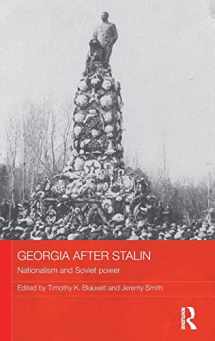
Georgia after Stalin (BASEES/Routledge Series on Russian and East European Studies)
ISBN-13:
9781138945234
ISBN-10:
1138945234
Edition:
1
Author:
Jeremy Smith, Timothy K. Blauvelt
Publication date:
2015
Publisher:
Routledge
Format:
Hardcover
214 pages
FREE US shipping
Book details
ISBN-13:
9781138945234
ISBN-10:
1138945234
Edition:
1
Author:
Jeremy Smith, Timothy K. Blauvelt
Publication date:
2015
Publisher:
Routledge
Format:
Hardcover
214 pages
Summary
Georgia after Stalin (BASEES/Routledge Series on Russian and East European Studies) (ISBN-13: 9781138945234 and ISBN-10: 1138945234), written by authors
Jeremy Smith, Timothy K. Blauvelt, was published by Routledge in 2015.
With an overall rating of 4.3 stars, it's a notable title among other
books. You can easily purchase or rent Georgia after Stalin (BASEES/Routledge Series on Russian and East European Studies) (Hardcover) from BooksRun,
along with many other new and used
books
and textbooks.
And, if you're looking to sell your copy, our current buyback offer is $0.3.
Description
This book explores events in Georgia in the years following Stalin’s death in March 1953, especially the demonstrations of March 1956 and their brutal suppression, in order to illuminate the tensions in Georgia between veneration of the memory of Stalin, a Georgian, together with the associated respect for the Soviet system that he had created, and growing nationalism. The book considers how not just Stalin but also his wider circle of Georgians were at the heart of the Soviet system, outlines how greatly Stalin was revered in Georgia, and charts the rise of Khrushchev and his denunciation of Stalin. It goes on to examine the different strands of the rising Georgian nationalist movements, discusses the repressive measures taken against demonstrators, and concludes by showing how the repressions transformed a situation where Georgian nationalism, the honouring of Stalin’s memory and the Soviet system were all aligned together into a situation where an increasingly assertive nationalist movement was firmly at odds with the Soviet Union.


We would LOVE it if you could help us and other readers by reviewing the book
Book review

Congratulations! We have received your book review.
{user}
{createdAt}
by {truncated_author}


